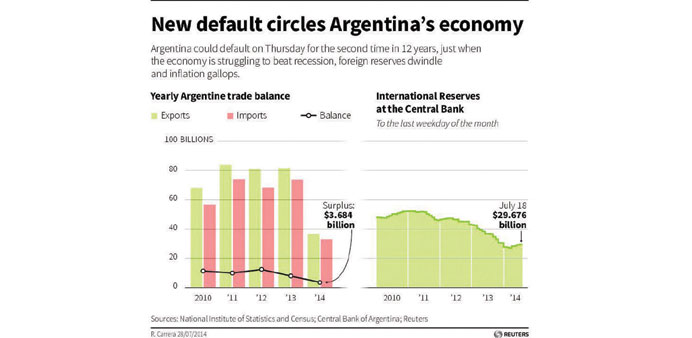Argentina was in a race against time yesterday to cut a deal by the end of the day with holdout investors suing it or win a reprieve from a US court, as a surge in the country’s bond prices fed optimism that an agreement was possible.
Attorneys for holdout hedge funds awarded $1.33bn plus interest by a US court arrived for talks at the New York offices of court-appointed mediator Daniel Pollack yesterday morning, with hours to go Argentina faces its second default in 12 years. Pollack arrived shortly thereafter.
Argentine Economy Minister Axel Kicillof arrived shortly after 11am EDT (1500 GMT) for the talks. The holdout funds were demanding demand full repayment on bonds they bought at a discounted rate after the country last defaulted in 2002.
The price of the South American country’s bonds surged 15% yesterday to levels not seen in 3-1/2 years, a sign to some investors that a deal was attainable before another damaging default.
“It’s trading like there’s a deal,” said a fund manager who holds Argentina’s restructured debt and requested anonymity. “I don’t have information, but someone knows there’s a deal.”
Latin America’s No 3 economy has for years fought NML Capital, a unit of Elliott Management Corp, and Aurelius Capital Management, the leading US hedge funds that rejected large writedowns. After exhausting legal avenues, it faces default if it cannot reach a last-minute deal.
The Buenos Aires government has pushed hard for a stay of the US court ruling that triggered Wednesday’s deadline.
The government had until midnight yesterday (0400 GMT today) to break the deadlock. If it fails, US District Judge Thomas Griesa in New York will prevent Argentina from making a July 30 deadline - representing the end of a 30-day grace period - for a coupon payment on exchanged bonds.
After defaulting in 2002, Argentina restructured its debt in two rounds, in 2005 and 2010. More than 90% of the bondholders agreed to accept new bonds with reduced payments. A consortium of Argentine banks is set to offer to buy out the holdout investors’ debt, in an 11th-hour deal aimed at averting a default, a senior banking executive familiar with the offer told Reuters yesterday.
The executive said there had not yet been any discussions with the US hedge funds leading the litigation and that the offer would require them to take a haircut, or reduced payment for the bonds.
“The idea is to sit down with the funds and buy all their debt. We have to negotiate the final amount, the terms and how payment will be made,” the executive told Reuters.
Argentina’s key dollar bond due 2033 jumped yesterday, and its debt insurance costs fell as investors took some cheer from Tuesday’s meeting.
The 2033 dollar discount bond surged as much as 12 points from Tuesday’s close to a bid price of 95.26, according to Thomson Reuters data. That dropped its yield to 8.86%, a level not seen since November 2010.
The cost of the country’s five-year credit default swaps, or insurance on the bonds, fell nearly 400 basis points from Tuesday’s close to 1,505 basis points, according to Markit. The CDS had hit six-week highs on Tuesday.
Argentina’s one-year credit default swaps dropped 51 basis points from Tuesday’s close to 4,708 basis points.
Kicillof’s unexpected appearance in New York raised hopes that there was still time to avert a default that would bring more pain to an economy already in recession, though not the economic collapse seen in 2002 when Argentina defaulted on $100bn in debt.
The country received a modicum of support on Tuesday when holders of its euro-denominated exchange bonds said a suspension would encourage a settlement.
They also said they would facilitate a deal by waiving the so-called RUFO clause that prevents Argentina from offering other investors better terms than it offered them.
Argentina has consistently argued the RUFO clause prohibits it from settling with the holdouts. However, the holdouts in a court filing yesterday urged US Judge Griesa to reject the exchange bondholders request that the stay be reinstated.

